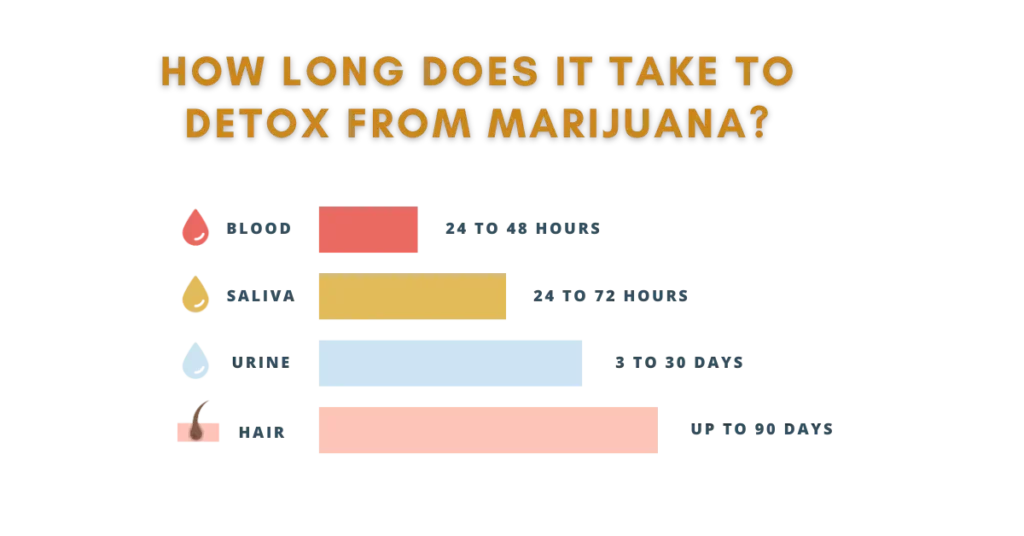How long does it take to detox from marijuana? Marijuana is a commonly used narcotic that has recently gained social acceptance. For those who take it frequently or excessively, it might still lead to issues. The requirement to detox from the substance is one of these issues. THC, the psychoactive component of marijuana, must be removed from the body as part of the detoxification process.
This article will examine the length of time it takes to detox from marijuana and other things you must be concerned about during a marijuana detox.
What Is Marijuana Detox?
Toxic material removal is referred to as detoxification, or detox for short. In the case of marijuana, detoxification means getting rid of THC from the body’s tissues and organs. The substance’s psychedelic properties are a result of the molecule THC.
After use, it can stay in the body for weeks or even months. To detox from marijuana, one usually abstains from using it while drinking a lot of water and other liquids to help the THC leave the body.

Detox From Marijuana: The Symptoms
Cannabis detoxification can be difficult, and some users may go through a variety of withdrawal symptoms. Depending on the person, the frequency and intensity of marijuana usage, and other variables, these symptoms might vary in severity. Here are a few typical signs of marijuana withdrawal:
Insomnia
Marijuana use can interfere with sleep cycles, and many people have trouble falling asleep during detoxification. Problems getting to sleep, remaining asleep, or waking up too early might all fall under this category.
Headaches
Some people may have headaches or migraines throughout the detoxification process. Dehydration or abnormalities in blood flow may be to blame for these headaches.
Mood Swings
Withdrawal symptoms from marijuana might include anger, anxiety, and despair. These symptoms can be challenging to control and can call for the help of medical professionals.
Vomiting and Nausea
These are typical withdrawal symptoms for various drugs, including marijuana. In more challenging situations, these symptoms could require medical treatment because they can be difficult to control.
Sweating and Chills
These are typical withdrawal symptoms that might happen throughout the detoxification process. Changes to the body’s temperature regulation systems frequently result in these symptoms.
Appetite Loss
Using marijuana can boost hunger, and some people may lose their appetite during detox. Consuming enough meals to maintain your physical health and energy levels can be challenging.
Physical Discomfort
During detoxification, some people may feel physical pain, such as tremors, restlessness, and aches and pains in their muscles.
How Long Does it Take to Detox from Marijuana?
Depending on several conditions, marijuana can stay in the body for varying amounts of time. Drug tests often check for THC (tetrahydrocannabinol), the main psychoactive component of marijuana. The following variables affect how long it takes to completely detox from marijuana and how long until the THC leaves the body:
Use Frequency
Marijuana users are more likely to have THC in their systems for longer if they consume it regularly or in large quantities.
Mode of Use
Using marijuana by smoking or inhaling it hastens the onset of effects but also reduces the amount of time THC is detectable in the body. When marijuana is eaten or used in other ways that take longer to get into the bloodstream, THC may be detectable for longer.
Metabolic Rate
How rapidly THC is metabolized and expelled from the body depends on the individual. People with faster metabolisms may be able to eliminate THC more quickly than those with slower metabolisms.
Body Fat
THC can build up in the body’s fat cells since it is fat-soluble. THC elimination from the body may take longer in people with higher body fat percentages.

Marijuana Detection Window
It’s crucial to keep in mind that the marijuana detection window varies greatly and depends on a number of factors. Because of this, these figures should only be used as rough guides because the exact duration that THC is detectable in the body may vary.
The three most popular ways to find THC in the body are blood, urine, and hair tests. The detection window varies greatly and is subject to various factors:
- Hair Test
- THC can be found in hair follicles for up to two weeks.
- Blood Test
- Up to 12 hours after consumption, THC can still be found in the bloodstream.
- Urine Test
- Depending on the frequency and dosage of use, THC can be found in the urine up to 30 days following use.
It’s also important to remember that some people may continue to experience the aftereffects of marijuana use even after THC is no longer measurable in the bloodstream. These side effects may persist for several days or even weeks after use, including mood or cognitive function changes.
Marijuana Detoxification Timeframe
Depending on the variables mentioned above, the marijuana detoxification timeline may change. However, this is a broad timeframe of what to anticipate:
Day 1-3: Symptoms like headaches, nausea, vomiting, and insomnia may occur throughout the first few days of detox. Often minor, these symptoms can be treated with over-the-counter drugs.
Day 4–7: Most people will have overcome the severe withdrawal symptoms by the fourth day of detox. They might continue to suffer certain aftereffects like mood changes, anxiety, and drug cravings.
Why Is Marijuana Detox Necessary?
For several reasons, marijuana detoxification may be essential. First of all, regular marijuana users may acquire a dependence on the drug and a tolerance to it, requiring them to use more of it to get the desired benefits. They may go through withdrawal symptoms if they try to stop using or cut back, which might include agitation, anxiety, insomnia, appetite loss, and mood swings.
However, suppose someone wants to pass a drug test for work or legal reasons. In that case, they might need to detox to get rid of the primary psychoactive component of marijuana, THC (tetrahydrocannabinol), which can linger in the body for several days or even weeks after usage.
Some individuals may decide to quit using marijuana as a part of a lifestyle shift or to enhance their general health and well-being. They can believe that using marijuana affects their daily activities, making them feel lazy or unmotivated, or they might wish to take a break to reassess their relationship with the drug.
Tips to Help Detox From Marijuana
Here are some suggestions to get you through the process of detoxing from marijuana:
- Consume lots of water and other liquids to help your body eliminate THC and reduce stress.
- Rest well to help manage withdrawal symptoms, including exhaustion and sleeplessness.
- To aid your body’s natural detoxification processes, eat a balanced diet.
- To keep yourself motivated during detox, consider asking for aid from friends, family, or a support group.
How Can Asheville Recovery Center Help?
Detoxing from marijuana might be difficult, but at Asheville Recovery Center, individual care is provided to ensure a successful detox from marijuana. If you or a loved one is suffering from marijuana addiction, contact us today to learn more about our addiction treatment programs.
Asheville Recovery Center can help detox from marijuana with programs that support individuals in safely and comfortably withdrawing from marijuana use. Our medical and clinical team can also offer counseling and support services to help with the challenges of addiction recovery.






